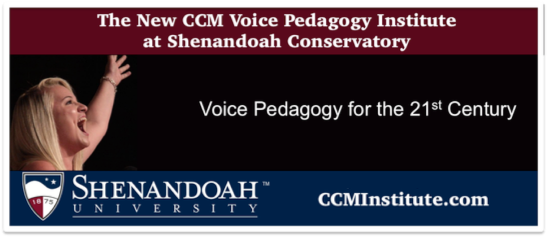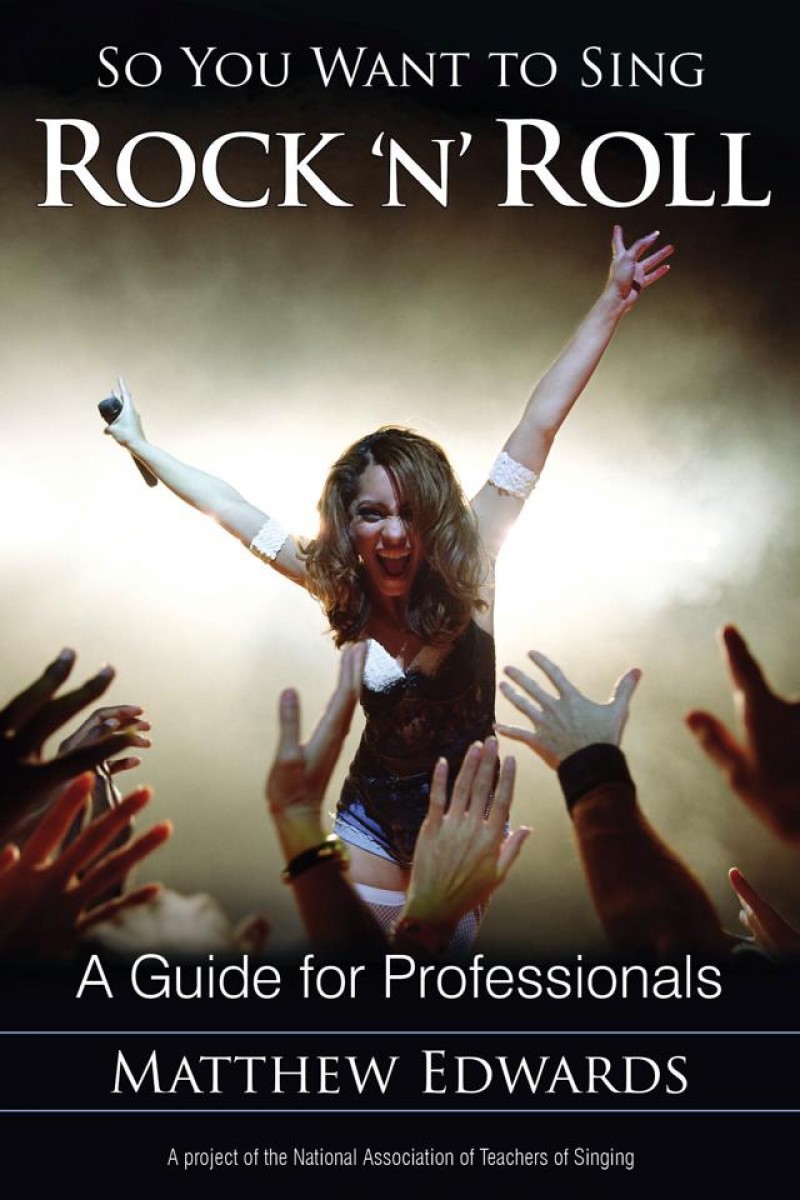Matt Edwards
Associate Professor of Voice, Shenandoah Conservatory Artistic Director of the CCM Vocal Pedagogy Institute
Mix it up Monday: I’m throwing down a challenge

It is Day #1 of the 2018-2019 school year and Mix it up Monday is back! It has been an amazing summer of traveling, teaching, and presenting and it has been a joy meeting so many of you at NATS, PAVA, Westminster Choir College, and the CCM Institute. Each summer I try to explore new ideas to freshen up my own teaching. At the end of the spring semester it became clear that what I needed to work on this year went beyond technique. In fact, what my students needed was a reset in the way they approached their work. So later this afternoon I am going to present five ideas I want my students to work on this year, I am calling it “Your GIFFT to Yourself” (maybe a little cheesy, but why not 🙂 ) I am challenging to them to take a massive step forward in their professional development and fundamentally change the way they think and act. So let’s jump right in to the five ideas: Growth Mindset, Improved Communications, Flexibility, Focus on Mental Health, and Training Like a Pro.
Growth Mindset = Success
Last year I noticed a lot of fixed mindsets in our program. If you are not familiar with the idea of Growth vs. Fixed mindset, this graphic gives you a brief summary.

I want my students to know that “So and So” is not innately better than you, “So and So” just may have already grown in an area that you are still growing in and there is nothing wrong with that. As Theodore Roosevelt said, “Comparison is the thief of joy.” When students focus on making small gains, they receive a dopamine release that makes them feel good. Which brings me to my next point.
The more frequently a student experiences the joy of a dopamine release, the better they will feel about doing the work. The problem is students often only focus on goals they have never achieved. If we can turn their focus to smaller steps, they will have more successes more frequently and experience more frequent dopamine releases. This means they will feel better about their work and become addicted to making progress. So this year I am asking them to focus on micro-masteries along the way. I want them to first think in terms of steps, things they can accomplish in 2-3 days. For instance, memorizing the words to a song or getting the rhythms right. When they reach that accomplishment they will get a dopamine release that will make them feel good about their time in the practice room. They then identify a new step to pursue. Students should have 3-6 steps that move them along the way to accomplishing a project, something they can accomplish in 1-2 weeks, For instance, learning a new song. Yes, you could just tell them to learn the new song and expect it to just happen. However, we as experienced singers already know what the process is (learn the words, learn the notes/rhythms, etc.) and we just do it. On the flip side, many of our students do not. They know how to click a few icons on a digital device to make magic happen. That’s not how you learn music. By setting up steps to complete the project, you are giving them a series of dopamine releases to keep them motivated. If learning the song is the only thing they focus on, they will have to wait one to two weeks to experience that feel good dopamine release, which can be quite the deterrent to progress. Learning the song is great, but then they need to get it to performance level, that should be a goal. Goals take several weeks or months to accomplish, but the journey is made easier when broken down into more manageable steps and projects. A reasonable goal would be to sing a song in an audition, to sing the song on a cabaret night, etc. Finally, what many of our students consider to be goals (i.e. performing on Broadway) are actually dreams. Dreams are things the student has never accomplished before. We want to encourage dreams, but if the brain programs itself to only release dopamine when the student reaches the dream, there are going to be a lot of disappointing days in their future. Instead, if we help them focus on achievable goals with the dream as the long-term achievement, they will feel good throughout the process and be more likely to succeed.
Finally, students are going to fail. The student with the fixed mindset will blame others or blame a lack of innate talent. Neither option is good for their mental health or growth. So instead, I am encouraging my students to give up the negative self-talk. When they fail, I want them to ask themselves what they can work on before the next time they ________. This seems simple, but for a student with a fixed mindset, it can be quite the challenge.
Improve Communications

IDK what ppl invented txt speak, but OMG IMHO and FYI it needs to stop. ROFL, LMK if you agree XOXO.
I’ve provided a key to help you understand all of that, because if you are like me it is easy to get lost. And that is why my students have got to stop using chat acronyms in their emails and professional communications. What many of them do not understand is that the way you communicate with others can be more important that the rest of the package. And whether they like it or not, the people who run the companies they want to work at are usually 10-20 years older than them (at least) and are not necessarily into the newest social media trends or text speak. So this year, I want them to start writing emails like working professionals. I’m asking them to:
- Begin emails with “Dr. X,” or “Bob,” not “Hey!” “Hey there” etc.
- Never use “text speak” in an email
- Keep the emails concise and to the point (no 1,000 word essays).
- Be kind; do not place blame, instead ask for help.
- For example: “I believe I misunderstood your direction, could you please confirm what you would like me to work on?” or “My perception is you are upset with my work in class. Can you please help me understand what I could work on improving?”
- NEVER send an email when you are angry – write it, save it as a draft, and review it 24-48 hours later
- And PLEASE use Grammarly to spell and grammar check your emails
But the content of the message is even more important than how it is composed. This photo has been making its way around Facebook and I think it provides a great place to start.

Source: Collective Evolution
Perhaps these does not apply to every situation, but it is a good set of guidelines to commit to memory as a first line of defense against emotional speak that can ruin relationships.
As many of you know I am a big fan of the book “How to Win Friends and Influence People.” There are lots of great points in that book, but if students can at least commit these three to memory, they will avoid a lot of conflict.
- The only way to get the best of an argument is to avoid it
- If you’re wrong, admit it quickly and emphatically
- Try honestly to see things from the other person’s point of view
Flexibility is King
We have over 20 faculty at SU that work with our musical theatre majors. While this provides an incredible learning environment, it also frequently results in students being confronted with conflicting ideas. In years past, the students have resisted this fact of life. This year, I want them to embrace it. They must learn that art is subjective and that is precisely why art is interesting. We can tell the story of Romeo and Juliet over and over again because each director’s view is different and each person’s definition of good story telling is subjective. In order to be successful in this business, students need to try everything that is asked of them and give every exercise 100% of their attention and energy. It doesn’t mean they will like it all, but by at least trying it they will learn something new that may make them reconsider what they already do. They need learn that growth happens when they are stretched in many directions, including ones they don’t like.
When they start auditioning they are going to present their work in front of a lot of different types of people with different views of what is “good.” The reality is there are a lot of audition choices that can get you a callback, but you can only get the job if you are flexible enough to take the adjustment the director, music director, choreographer, etc. gives you. If they have spent their whole educational career rejecting and refusing to fully explore new ideas they don’t like, they will fall flat on their face when they are inevitably asked to make one of those choices in a callback.
Focus on Your Mental Health
Because of all of the television singing competitions, students are beginning to think this career is a sprint. It is not. This is a MARATHON. This goes back to the ideas laid out in the Growth section above. Students need to slow down, enjoy life a bit, and celebrate the work more than the product. When they sprint through their education, not only do they fail to perfect their craft, they also usually become sleep deprived. Sleep deprivation amplifies depression, which leads to negative self-talk. Once the student starts down that path, it can be hard to get them out of it.
This year I want my students to embrace that there is nothing shameful about having mental health issues. They need to find help when they need it, ask for guidance when they are lost, and look out for those around them. We cannot afford to lose any more great minds to mental health disorders and we can help stop the losses by supporting each other and asking for help when we need it.
Train like a pro
Finally, I need them to start training like pros. That means getting in the practice room every day, not taking the summer or winter break off, and realizing that classes and practice rooms are where the magic happens, performances are icing on the cake. The science behind this is pretty clear – motor skills require repetition to acquire mastery, and that means you MUST practice daily. Young students also fail to realize how much they can learn from watching others. Observation is a critical part of the training process, but while we as teachers know that and have figured out how to learn in that setting, our students often do not. So we need to teach them. This year I am asking our students to think about the following when observing others.
- How does that feedback relate to me?
- How would I sing/act/dance that differently?
- Why might that person’s choice be a better choice than mine?
- Why might my choice be better?
- How can I apply those notes to other material I am working on?
And finally, pros PUT THEIR PHONES AWAY. No matter how hard you try, that phone is going to be a distraction to you if it is nearby. As a society we are addicted. So leave it in your bag and turn it on airplane mode. “But I need to take notes” they will say. They are correct, and that is what a notebook and a pen are for. Not only will they retain the information better by physically writing it down, but they will also have a notebook full of ideas they can carry around with them for the rest of life.
I am excited to start this journey with my students, and I hope some of you will join me in changing the mindsets of our future performers. By doing so, I think we will see better results than we can achieve from pedagogical tools alone.
Do you have similar concepts you want your students to learn this year outside of technique? Do you have ideas that should be on my list? If so, you can contribute to the conversation below in the comment section. If you are not already following the blog, please sign-up below to receive an email each time there is a new post. As always, thank you for reading and if you are heading back to school too, have a wonderful year!
Matt




Thanks Matt! What great ideas to start off a new year. Have a good week!
LikeLike
We must have been at some of the same conferences 😉 I was trying to remember the step – project – goal – dreams progression last night. It will be so useful to get students out of the comparison to others mode that they all seem to be in.
Thanks Matt! I always look forward to Mix It Up Monday – a terrific way to start the week.
LikeLike
Thanks, Matt!!
LikeLike
Thank you for this! As I complete my syllabi tonight to hand out tomorrow, there is so much here that resonates with me. I will definitely join you on this journey. Thanks again for the perspective. Peace, Ann
LikeLike
Compelling content beautifully assembled, Matt. As an instructor of both Music (voice) and Communication, I process these concepts often and aim to facilitate these connections. Science is so cool!
LikeLike
Always fantastic!
LikeLike
Great article, and much needed. Thank you!
LikeLike